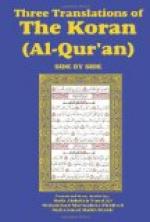And they who, when monished by the signs of their Lord, fall not down thereat, as if deaf and blind:-
And who say, “O our Lord! give us in our wives and offspring the joy of our eyes, and make us examples to those who fear thee:”
These shall be rewarded with the High Places of Paradise for their steadfast endurance, and they shall meet therein with-Welcome and Salutation:-
For ever shall they remain therein: a fair abode and resting-place!
Say: Not on your account doth my Lord care if ye call not on Him! ye have treated his Apostle as an impostor: but bye and bye a punishment shall cleave to them.
_______________________
1 See Sura [lxv.] xxi. 49.
2 Comp. Sura [lxxiii.] xvi. 105. The frequency with which Muhammad feels it necessary to rebut this charge by mere denial is strongly indicative of its truth.
3 “The meaning may possibly be that the teachers of Muhammad were persons who had taken refuge in Arabia for offences and heresies.” Sprenger, Life of M. p. 96, n. Or, but they utter an injustice and a falsehood. Nöldeke combats Dr. Sprenger’s supposition that “Tales of the ancients” (verse 6) is a book. Hist. of Qoran, p. 13.
4 Supply, we will not believe.
5 In your ascriptions of divinity to them. Beidh.
6 Or, far, far be they removed. The same words occur at the end of verse 55. The Commentators doubt whether they are spoken by the wicked of the impossibility of their attaining Paradise, or by the angels to the wicked.
7 Said by Beidh. to be the polytheist Okbeh, the son of Abu Mo’eyt, who by Muhammad’s persuasion professed Islam, but afterwards retracted to please Ubei ben Khalaf. See Gagnier’s Vie de Mahom. i. 362.
8 Ar. fulani (whence the Spanish fulano) identical with the Heb. p. 155, used of a person only in Ruth iv. 1, but by the Rabbinic writers, constantly.
9 Or, abandoner.
10 This verse shews that the Koran was of gradual growth in the time of Muhammad himself.
11 Lit. parables.
12 Lit. vizier.
13 It is uncertain whether Rass is the name of a city in Yemama; or merely, as some interpret it, of a well near Midian; or, according to others, in the territory of Hadramont.
14 Geiger is mistaken in supposing that this passage alludes to 2 Kings xx. 9 12, and his translation is inaccurate.
15 Lit. quiescent, i.e. always the same.
16 According to some commentators, Muhammad here speaks of the waters of the Tigris, which do not mingle with the salt water of the sea till they have reached a considerable distance from the river-mouth. See Zech. xiv. 8.
17 See Sura [cv.] xxiv. 44, n.
18 “Thou art taught that whoever would make a profit by the Law depriveth himself of life.” Pirke Aboth, i. 4. This precept is of frequent occurrence in the Talmud.




